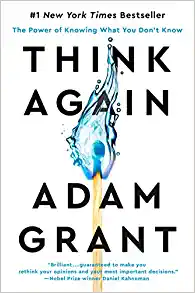Adam Grant’s newest book, “Think Again: The Power of Knowing What You Don’t Know,” is an essential read for individuals seeking to enhance their thinking and decision-making skills. As a distinguished organizational psychologist and Wharton professor, Grant urges readers to challenge their preconceptions and convictions and embrace the uneasiness that comes with altering their opinions.
Grant’s book, Think Again: The Power of Knowing What You Don’t Know, is divided into three sections: “Rethinking Our Own Minds,” “Rethinking the Minds of Others,” and “Rethinking Our Institutions.” The first section delves into the significance of being intellectually humble and receptive, and the perils of overconfidence and confirmation bias. Grant advocates that we foster a mindset of inquisitiveness and an eagerness to learn from our errors to progress and prosper.
Grant’s second section of the book focuses on the art of persuasion and how to communicate effectively with people who have different beliefs. He stresses the significance of active listening, empathy, and finding common ground while cautioning against tribalism and demonizing those who hold opposing views.
Finally, in the third section, Grant examines how our institutions, from schools to businesses to governments, can benefit from a culture of learning and unlearning. He argues that leaders need to create environments that encourage dissent and experimentation, and that failure should be viewed as an opportunity to learn and improve.
One of the strengths of this book is Grant’s use of real-world examples and research to illustrate his points. He draws on everything from the history of science to current political debates to highlight the dangers of closed-mindedness and the benefits of intellectual humility. He also includes practical exercises and tips for readers to apply the concepts to their own lives.
Another strength of the book is its accessibility. Despite covering complex topics, Grant writes in a clear and engaging style that is easy to follow. He also uses humor and personal anecdotes to keep the reader’s attention, making this an enjoyable and informative read.
However, the book is not without its flaws. At times, Grant’s focus on individual responsibility and growth can feel overly individualistic and disconnected from larger social and political issues. While he acknowledges the importance of systemic change, he tends to emphasize the power of individual action over collective action.
Overall, Think Again is an important and timely book that offers valuable insights for anyone seeking to improve their thinking and decision-making abilities. Grant’s emphasis on intellectual humility, open-mindedness, and a willingness to learn from mistakes is particularly relevant in our current political and social climate, where tribalism and dogmatism can seem all too prevalent. This book reminds us that we can all benefit from questioning our assumptions and beliefs and that growth and progress require a willingness to be uncomfortable and vulnerable.
Think Again is a thought-provoking and practical guide to improving our thinking and decision-making abilities. It is a timely reminder that changing our minds and learning from our mistakes is a crucial skill in our rapidly changing world. Highly recommended for anyone who wants to become a more effective thinker and leader.
